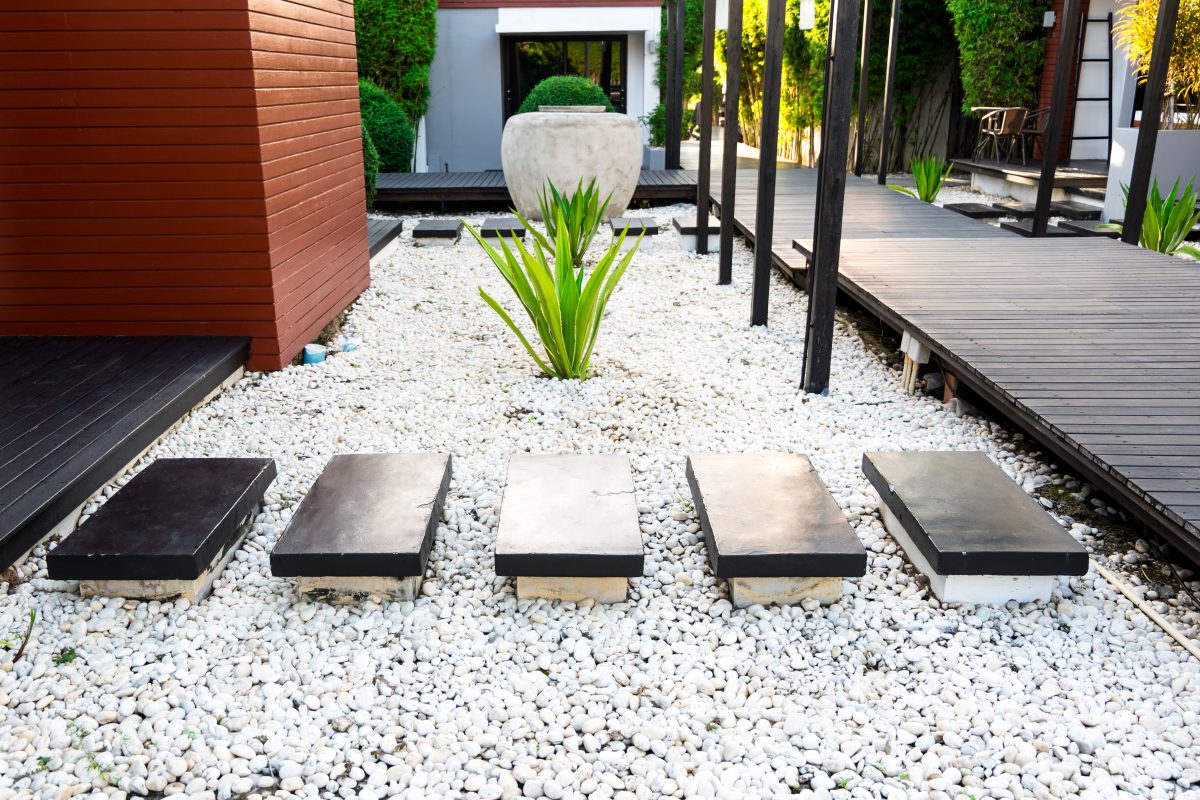
But why are these tiny stones so popular? Well, apart from their aesthetic appeal which can transform any dull space into a picturesque vista in no time at all – they’re also extremely durable. Unlike organic mulches such as bark chips that decompose over time, white rocks last longer meaning you won’t need to replace them frequently.
Moreover, let’s not forget about their heat reflecting properties. In scorching summer months when temperatures soar high up in the 90s (or even hit triple digits), these little fellows will do wonders by keeping your plants cool and hydrated. Yes folks! It turns out white rocks are quite the multitaskers of landscape design – adding beauty while promoting plant health at the same time!
The Aesthetics of Using White Rocks in Your Landscape
I’ve always been fascinated by the transformative power of white rocks in landscaping. When used strategically, they can turn an ordinary garden into a work of art.
Firstly, let’s talk about their undeniable charm. White rocks radiate purity and simplicity – characteristics that are often associated with modern design trends. They’re not just plain old stones; they’re elements that bring balance and elegance to any landscape.
But it’s not all about looks! Functionality is also a key factor here:
- Erosion Control: White rocks are great for preventing soil erosion, especially on sloped areas.
- Weed Prevention: Laying down a layer of these gems can deter weed growth.
It’s important to note how versatile white rocks really are! Their neutrality allows them to blend well with various styles – from Mediterranean-inspired gardens filled with vibrant plants to minimalist Zen gardens where tranquility reigns supreme.
One crucial aspect I’d like you to remember: size matters! You might think it doesn’t make much difference if you use small pebbles or larger boulders, but trust me – it does!
| Rock Size | Best Use |
|---|---|
| Small | Paths and patios |
| Medium | Garden borders |
| Large | Focal points |
Now let’s consider placement. Do you want your rock features scattered randomly or arranged meticulously? That depends on the overall feel you want for your space. Remember though – even ‘random’ placements require careful thought!
Lastly, keep maintenance in mind while planning your landscape design using white rocks as improper care may lead its beauty fade over time.
In conclusion (oops… sorry), using white rock landscaping isn’t merely an aesthetic choice — it’s functional too! And while there is no one-size-fits-all approach when incorporating these natural beauties into our outdoor spaces; remember this — imagination is the only limit!
Practical Benefits of Landscaping with White Rocks
I’m often asked, “Why should I use white rocks for landscaping?” My answer is simple: it’s not just about aesthetics. Sure, these stones can add a clean, modern touch to any garden or yard. But there’s more to it than that.
One of the main benefits I’ve found in using white rocks is their ability to reflect sunlight back into the plants. This might sound like a minor detail but believe me, during those hot summer days when every bit of shade counts – this reflection can be a game-changer for your plants.
Another great benefit lies in its practicality as mulch replacement. Here are some reasons why:
- Weed control: Just like traditional mulch, white rocks prevent weed growth by blocking sunlight from reaching weed seeds.
- Water conservation: They reduce water evaporation from soil which means you’ll need less watering.
- Temperature regulation: These rocks help keep soil cool during the day and warm at night.
| Benefit | Explanation |
|---|---|
| Weed Control | Blocks sunlight from reaching weed seeds |
| Water Conservation | Reduces water evaporation |
| Temperature Regulation | Keeps soil temperature consistent |
Furthermore, let’s talk durability and maintenance – two factors that have always been crucial for me when deciding on landscape elements. Unlike organic mulches which decay over time and need constant replenishment; white rock landscaping lasts much longer without any significant degradation or color fading.
Lastly but certainly not least; pest prevention! Insects are far less likely to call your garden home if they don’t find an inviting environment—and trust me—rocks aren’t high up on their list!
In summing up my experience with utilizing white rocks in landscapes over many years; they’re easy on eyes while being hardworking behind scenes making them an excellent choice whether you’re going for functionality or style—or better yet—a combination of both!
Colin Macmillan is a seasoned entrepreneur and the CEO of Riverwood Landscape, a leading landscaping company based in Canada. He has been at the helm of the company since leaving high school, demonstrating his strong leadership skills and business acumen.
Colin’s expertise lies in various aspects of landscaping, including lawn care, interlocking, sod installation, and commercial maintenance. His hands-on approach and dedication to the craft have been instrumental in building Riverwood Landscape into a reputable brand.
One of his most notable achievements is the creation of a successful landscape franchise that services multiple locations. This accomplishment underscores his strategic thinking and ability to scale operations effectively.
Colin has also had the privilege of working with Guelph Hospital for landscaping and maintenance, a testament to the trust and reliability that his company has earned over the years.
His professional mission is to offer the best services and experiences for customers, a goal that he tirelessly pursues. Colin’s commitment to excellence and customer satisfaction continues to drive the growth and success of Riverwood Landscape.








